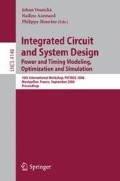Abstract
This paper describes a novel gate-level dual-threshold static power optimization methodology (GDSPOM), which is based on the static timing analysis technique for designing high-speed low-power SOC applications using 90nm MTCMOS technology. The cell libraries come in fixed threshold – high Vth for good standby power and low Vth for high-speed. Based on this optimization technique using two cell libraries with different threshold voltages, a 16-bit multiplier using the dual-threshold cells meeting the speed requirement has been designed to have a 50% less leakage power consumption when compared to the one using only the low-threshold cell library.
Access this chapter
Tax calculation will be finalised at checkout
Purchases are for personal use only
Preview
Unable to display preview. Download preview PDF.
References
Kuo, J., Lou, J.: Low-Voltage CMOS VLSI Circuits. Wiley, New York (1999)
Kao, J., Narendra, S., Chandrakasan, A.: MTCMOS Hierarchical Sizing Based on Mutual Exclusive Discharge Patterns. In: Design Automation Conference Proc., pp. 495–500 (June 1998)
Usami, K., Kawabe, N., Koizumi, M., Seta, K., Furusawa, T.: Automated Selective Multi-Threshold Design for Ultra-Low Standby Applications. In: Low Power Electronics and Design Conference Proc., pp. 202–206 (2002)
Wei, L., Chen, Z., Johnson, M., Roy, K., De, V.: Design and Optimization of Low Voltage High Performance Dual Threshold CMOS Circuits. In: Design Automation Conference Proc., pp. 489–494 (June 1998)
Samanta, D., Pal, A.: Optimal Dual-VT Assignment for Low-voltage Energy-Constrained CMOS Circuits. In: International Conference on VLSI Design, pp. 193–198 (January 2002)
Wang, Q., Vrudhula, S.: Algorithms for Minimizing Standby Power in Deep Submicrometer, Dual-Vt CMOS Circuits. IEEE Trans. Computer-Aided Design of IC and Systems 21(3), 306–318 (2002)
Artisan: TSMC 90nm CLN90G Process SAGE-X v3.0 Standard Cell Library Databook
Artisan: TSMC 90nm CLN90G HVt Process 1.0-Volt SAGE-X v3.0 Standard Cell Library Databook
Synopsys, PrimeTime User Guide, v2004.12
Wallace, C.S.: A suggestion for a fast multiplier. IEEE Trans. Computers EC-13, 14–17 (1964)
Author information
Authors and Affiliations
Editor information
Editors and Affiliations
Rights and permissions
Copyright information
© 2006 Springer-Verlag Berlin Heidelberg
About this paper
Cite this paper
Chung, B., Kuo, J.B. (2006). Gate-Level Dual-Threshold Static Power Optimization Methodology (GDSPOM) Using Path-Based Static Timing Analysis (STA) Technique. In: Vounckx, J., Azemard, N., Maurine, P. (eds) Integrated Circuit and System Design. Power and Timing Modeling, Optimization and Simulation. PATMOS 2006. Lecture Notes in Computer Science, vol 4148. Springer, Berlin, Heidelberg. https://doi.org/10.1007/11847083_23
Download citation
DOI: https://doi.org/10.1007/11847083_23
Publisher Name: Springer, Berlin, Heidelberg
Print ISBN: 978-3-540-39094-7
Online ISBN: 978-3-540-39097-8
eBook Packages: Computer ScienceComputer Science (R0)

